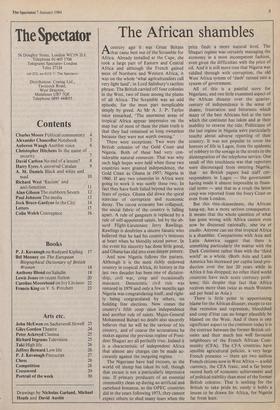The African shambles
Acentury ago it was Great Britain that came best out of the Scramble for Africa. Already installed at the Cape, she took a large part of Eastern and Central Africa and although the French gained most of Northern and Western Africa, it was on the whole 'what agriculturalists call very light land', in Lord Salisbury's tactless phrase. The British carried off four colonies in the West, two of them among the plums of all Africa. The Scramble was an odd episode, for the most part inexplicable simply by greed. As Mr A. J. P. Taylor once remarked, 'The enormous areas of tropical Africa appear impressive on the map but of most of them the plain truth is that they had remained so long ownerless because they were not worth owning.'
There were exceptions. Two were the British colonies of the Gold Coast and Nigeria. Both of these had very con- siderable natural resources. That was why such high hopes were held when those two countries were granted independence, the Gold Coast as Ghana in 1957, Nigeria in 1960. If any two countries in Africa were going to work it was surely these two. In fact they have both failed beyond the worst fears of cynics. Ghana slid down the spiral staircase of corruption and economic decay. The cocoa economy has collapsed, the social fabric of the country is falling apart. A rule of gangsters is replaced by a rule of self-appointed saints, led by the ab- surd Flight-Lieutenant Jerry Rawlings. Rawlings is doubtless a sincere fanatic who believed that he had his country's interests at heart when he bloodily seized power. In the event his sincerity has done little good, and Ghana has slid into even deeper penury.
And now Nigeria follows the pattern. Although it is the most richly endowed country in tropical Africa, its history in the last two decades has been one of dictator- ship, civil war, coup and occasionally massacre. Democratic civil rule was restored in 1979 and only a few months ago Nigeria was congratulating itself, and right- ly being congratulated by others, on holding free elections. Now comes the country's fifth coup since independence and another rule of saints. Major-General Mohammed Buhari no doubt also sincerely believes that he will be the saviour of his country, and of course the accusations he makes against the previous regime of Presi- dent Shagari are all perfectly true. Indeed it is a characteristic of independent Africa that almost any charges can be made ac- curately against the outgoing regime.
The Nigerians have had excuses, as the world oil slump has taken its toll, though that excuse is not a particularly impressive one. If primary producers of an essential commodity clean up during an artificial and cartelised bonanza, as the OPEC countries did in the years following 1973, they cannot expect others to shed many tears when the price finds a more natural level. The Shagari regime was certainly managing the economy in a most incompetent fashion, even given the difficulties with the price of oil. And it is still more true that Nigeria was riddled through with corruption, the old West Africa system of 'dash' turned into a system of government.
All of this is a painful story for Nigerians, and one little examined aspect of the African disaster over the quarter- century of independence is the sense of shame, frustration and bitterness which many of the best Africans feel at the turn which the continent has taken and at their inability to reverse the tide. Politicians of the last regime in Nigeria were particularly touchy about adverse reporting of their country. It was not popular to cover the horrors of life in Lagos, from the epidemic of robbery to the sewage in the streets to the disintegration of the telephone service. One result of this touchiness was that reporters
were discouraged from entering Nigeria, that no British papers had staff cor-
respondents in Lagos — the government having made it almost impossible in finan- cial terms — and that as a result the latest coup was reported from the Ivory Coast or even from London.
But this thin-skinnedness, the African hang-up, has a more serious consequence.
It means that the whole question of what
has gone wrong with Africa cannot even now be discussed rationally, sine ira et studio. Anyone can see that tropical Africa
is a shambles. Comparisons with Asia and Latin America suggest that there is something particularly the matter with the Dark Continent rather than with the 'third world' as a whole. (Both Asia and Latin America has increased per capita food pro- duction over the last 20 years while in Africa it has dropped; no other third world countries have such acute currency prob- lems; this despite that fact that Africa receives more than twice as much Western aid per head as Asia.) There is little point in apportioning blame for the African disaster, except to say that recession and regression, bloodshed and coup d'etat can no longer plausibly be blamed on the West. And if there is one significant aspect to the continent today it is the contrast between the former British col- onies and their much less well favoured neighbours of the French African Com- munity (CFA). The CFA countries have sensible agricultural policies, a very large French presence — there are two million French citizens now in West Africa— a solid currency, the CFA franc, and a far better record both of economic achievement and of political stability than most of the former British colonies. That is nothing for the British to take pride in; surely it holds a lesson to be drawn for Africa, for Nigeria far from least.


































 Previous page
Previous page